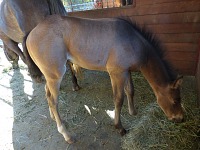 |
| Before I got back to the stables, Bandit has grown up so much he started tasting hay. |
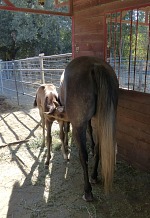 |
| Bandit with mom. |
My first trip after returning back home went, of course, to my goaties.
Obviously everybody was doing fine, for they did not show any signs of joy from
my returning. Yes, it's fine going out on walks, but with such beautiful and
nice goats it's not problem securing attention and admiration from other
visitors to the stables. At the bottom of my heart, I was happy for them,
for at least I did not need to have bad conscience from having enjoyed my
vacation, while my animals would suffer.
There was a nice surprise, too. I discovered that during our absence,
"new life" came to the stables. Rather unexpectedly, a new foal
was born in the lower stables — his mother's owner had no idea about
pregnancy of a newly bought mare, until spring vaccination clinic. The little
colt is beautiful and fearless, and so is his mother — easily letting
the youngster mingle with people and though she keeps an eye on him a bit,
she does not interfere. Other local mares are fascinated by the baby horse,
and play aunts.
A second surprise were chicks in goat stables. A hen named Nugget, who refused
to leave the coop and demanded to sit on her eggs, brooded two chicks.
I have seen many, but this was the first time I've seen a couple actually
produced by a hen sitting on eggs all the way. Nugget has been taking excellent
care of her babies, kept herding them together, leading them to grain —
and chased away any intruders. Over time she agreed that a helping wing would
come handy — and accepted an old little hen named Cookie, so the two
chicks suddenly had a mother and an aunt.
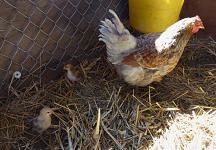 |
| Chicks hatched in goat stables. |
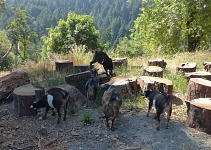 |
| Goaties showed no surprise upon my reappearance — everybody would happily and regularly take such beautiful goats to a grazing walk. |
My baby goats long outgrew the age when they still need mothers' milk, and so
I started another round of milking attempts. This time more seriously —
not just taking a portion of whatever the boys would leave behind; I started to
separate the baby goats from the adults. First for a few hours in the morning,
and when I've seen that the little wethers generally did not care, while mother
goats enjoyed having it easy without children, I pushed harder, and began in
cooperation with resident Ashley and stable hand Trudy (thus Casper's owner)
separate the boys during nights as well.
Casper, however, threw a monkey wrench into my plans, when he suddenly looked
very ill one night and got a diarrhea. My new vet was on vacation, and so
I dealt with an urgent care station. Their vet admitted outright that she knew
nothing about goats, and that she would look into a goat book and we would
proceed with whatever she can find in it. Ashley loaned me a thermometer in
the meantime — well — she did not want it back once she discovered
it's, even with goats (just like with little babies), taken in the anus.
Casper had 103.4 degrees Fahrenheit (39.6°C), which was exactly on the
boundary between goat fever (103.5°F a.k.a. 39.7°C — normal goat
temperature is 39.2°C). In the end the vet and I reckoned that we would give
Casper a shot of Banamine — like ibuprofen for animals — for it is
an analgesic and antipyretic, and we would see if he gets better. While we were
still pondering that, I tried to force him to eat some of the collected milk,
as with such a small baby goat the greatest risk with diarrhea is dehydration.
I had Banamine at home in my fridge, so I left Trudy with Casper and drove
to fetch the shots and Lisa. I must say that this year's goat dramas tire me
out, and luckily even this time everything ended well, and fifteen minutes
after receiving the injection Casper went under own power to suckle off Licky.
Thus he interfered with my milking schedule — since I wanted to leave him
two days to recover and unfettered access to his mother and her milk, to build
up his strength again. And I had to have a word with Claire, the boss of summer
camps, that I would henceforth ban summer campers from accessing my baby goats
— Casper most likely ate something bad, and got this forbidden treat
probably thanks to the camps and some rascal kids.
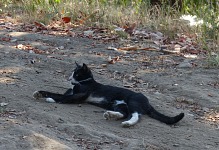 |
| Resident cat Hugo Jay also looked all right. |
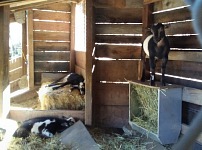 |
| Goat boys stayed quite unmoved when separated from their moms, so I decided to keep them that way at nights as well... |
Meanwhile, our Tom started working as a summer camp counselor. He spent most
time with older kids, who roamed in the woods above the stables. Perhaps I
should elaborate about
Tribal Wisdom Academy
— although it's a suburban summer camp, it offers incredible things in
today's times. Participants are released into the forest, equipped with
a hammer and a little saw; they may build shacks and bunkers, explore ravines,
try their skills in cold smithing. No wonder places are booked long before
summer — especially this year.
Many parents and children alike have been truly
sick of distance schooling at home, or of just being locked up, with no chance
to escape. Demand did not abate despite face masks being required in the camp.
And to give my two cents, I would like to point out there is no INDOOR in the
context of this whole camp, kids are out in any weather, and still they had to
suffocate in temperatures over ninety degrees, in masks. We won't even try to
speculate how hygienic is such a mask, being perpetually shifted by the kid
with hands dirty from the forest or the stables.
Tom was very happy at the camps, though often quite tired — actually for
the first time in his life he tested how it feels to go to work every day (he
did even work on a few Sunday afternoons) for six to eight hours. But he also
tried out that it's rather nice to have a job where you do something
interesting, where you get appreciated (Claire did not spare praise) —
and where you can earn notable amounts of money.
Lisa fared worse, for after returning from our trip, her asthma had acted up,
and she spent several weeks whimpering on a couch. Going to work at a camp,
in a mask, did not make sense, and even so she had problems breathing.
Persistent heat waves, in dusty and smoky air, give her hard time every year.
It hinders her in her vaulting. Now combine her asthmatic cough with the way
people suddenly look at anybody who even sneezes, and Lisa was basically
sentenced to spending time in house arrest.
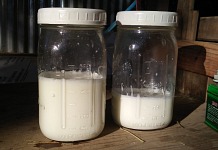 |
| ...to let me have some leftover milk. |
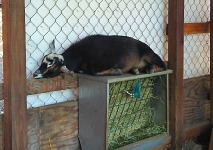 |
| Casper spooked us a bit with his illness, but soon was alright again. |
After about three weeks I talked her into going vaulting again — her
coach Emma had had asthma in her youth, and thus was ready to tolerate coughing
and breath-catching Lisa. I think emerging from the house did Lisa good. Next
virtual competition had approached — Lisa refused to participate, saying
she has not practiced; eventually Emma and I convinced her to record her
compulsories, for in the worst case we just would not submit the video. I tried
to entice Lisa to extend it to a free-style, because if it truly went poorly,
it would get scrapped and "no one would see". Lisa gave me
a performance of an incredible teenage hysteric fit — only so that on the
very day of the competition, literally in the last minute, she
"herself" concluded it actually was no big deal, and why not try it?
I am being verbatim with the last minute — Lisa did not even have enough
time to change her costume, so she performed in her team dress. Well, at least
something.
By then, end of summer was upon us; that is, if that expression means for you
the beginning of a new school year. We developed a revolving door and
a permanently busy phone line, as other, desperate parents, would try to figure
out how this virtual school our children had been attending, works — for
it became obvious to anyone that schools won't re-open, and thus kids and
consequently their parents face another school year without in-person
instruction,
in a completely dysfunctional system. Unfortunately, virtual schools got
completely overbooked by mid-summer, and would not accept more applicants, not
even on a waiting list. After summer camps in masks, canceled sport events,
competitions and races, with ongoing lock-down on gyms and climbing facilities,
permits needed for entering National Parks, checkpoints established in lines to
grocery stores (not only you have to wait half an hour on markings, but even
there it's expected you wear a face diaper); this was perhaps the last drop.
We have been thinking about moving for a long time; already our trip to
Colorado in 2016 was exploratory — some time in the year 2015 or 2016 we
came to realize that the California,
which we had grown so fond of years ago, the
original place, is not there anymore. Cosmopolitan diversity had decomposed into
simple out-of-control overpopulation — rush-"hour" on freeways
lasts practically whole day; driving fourteen miles to a dentist takes at least
an hour 'round noon (no use to try on mornings and afternoons). Leaving on
a weekend (i.e. later than Friday noon) out of Silicon Valley means being stuck
for many hours in jams. We had to do our skiing on weekdays, for during
weekends there often has been no place to park in the mountains.
Making a doctor's appointment means planning best a year ahead, and in an urgent
case you get your turn in several weeks. Nobody builds American suburb houses
anymore — edges of our city turned into high density apartment complexes,
and infrastructure is lacking — our own kids, when they attended regular
school, often held class in temporary modular boxes, and the reason we had to
take them out of that system was a consequence to public education, under the
barrage of thousands of students, turned into mindless mass production, where
any individuality is ground down by the system into a fine dust. Somehow the
hordes of social engineers never thought of the fact that all these millions of
people depend on water that is ducted for hundreds of miles from Sierra Nevada,
and the supply is far from endless. In parts of the country people still have
their own wells — which routinely run dry and cause strife among
neighbors. Anderson Reservoir on the southern end of Silicon Valley has reached
its end of life — and somehow articles about there surely being enough
water for everybody, make us more nervous, not the other way around.
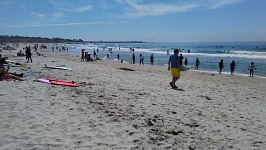 |
| Sid and I went on our own to Asilomar — we were surprised by how many crowds came to the beach — people never left to their overseas vacations. |
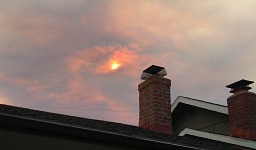 |
| Wildfires got unpleasantly close this time. |
Our plans about moving were vague at first, pivoting around Sid's job(s), Lisa's
vaulting — but even hinging on a fact that we have our friends in
California, whom we would find hard to leave — so we kept talking about
perhaps renting out our house, while trying to live somewhere else; we simply
wished to take it slowly. But the situation with covid panic, and overall
political climate, began to elude common sense, and so on one day in mid-August
Sid and I looked at each other, and Sid said, "I think we should move,
as soon as possible, and for good."
So I wrote to my friend, who works at a real estate agency, whether she knows
any good realtor. She recommended Eric; just as Santa Cruz Mountains began to
burn, on August 19, he came to see us and the house, and to talk about
getting things ready for the market. He called the next day, whether he could
bring a potential buyer in the evening. On the third day he came with an offer
to buy — as-is, no other conditions — for the buyer's company
is in the business of buying old houses, fixing them up — and immediately
selling again — so he did not mind that our bathroom had a shower leak,
that our kitchen oven was original from 1964, and that the roof would need
new shingles — as the whole house would get gutted and re-modeled. And so
on Friday we signed the contract, and rushed out to evacuate our goats from
spreading wildfires — thus demonstrating a perfect example of a
"fire sale" — adjusting the emergency price of your goods to
the fact that they come from one side of your warehouse, while the other side is
already burning. Consider: selling a house in two days is rather fast.














